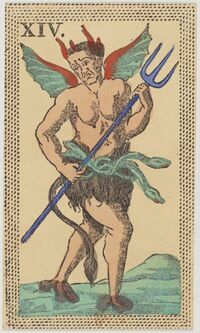
Image of the Devil from a late 19th century Italian Tarot deck.
"The Three Apprentices" (German: "Die drei Handwerksburschen"; also published in English as "The Three Journeymen") is a German fairy tale. It is included in the 1815 second volume of Kinder- und Hausmärchen (Children's and Household Tales), the anthology of German folktales compiled by the Brothers Grimm, and all subsequent editions of the complete anthology.
The plot is set in motion when the story's three title characters, who have just lost their jobs and are feeling down on their luck, meet the Devil. The Devil promises to make the three apprentices rich if they help him to claim the soul of a certain wicked person. He reassures the three men that their own souls are not in danger. A condition of the bargain that the three men make with the Devil is that each man can say nothing apart from a certain phrase that he has been assigned, regardless of the questions he is asked.
Similar stories exist in French and Hungarian folklore. Those stories usually involve three students who each say nothing apart from a certain Latin phrase. The earliest known written story that somewhat resembles "The Three Apprentices", minus the supernatural element, is about three Welshmen who each only know one phrase in English. It is included in the work Summa Predicantium by the 14th century English friar John Bromyard.
Plot[]
There are three apprentices who have always worked together in various jobs in various towns. When they find there is no work for them in the town where they currently reside, they sadly conclude that they may have to go their separate ways to look for work elsewhere.
A stranger approaches the three apprentices and says that he can make them rich. The apprentices soon realize that the stranger is the Devil. They fear that having anything to do with him could mean condemning their souls to Hell. The Devil tells the three men that he has no interest in their immortal souls. He does, however, want their help in claiming the soul of someone else who is almost damned already. He promises to reward them if they help him. The three apprentices agree to the bargain. The Devil tells them that, until he says otherwise, they can each only say one phrase no matter what questions they are asked. The first apprentice can only say "All three of us." The second can only say, "For money." The third can only say, "And quite right too!"
The three apprentices make their way to an inn. They manage to get food and lodgings for themselves, in spite of the fact that they say nothing apart from the phrases that the Devil told them to say. The odd behavior of the three men does not go unnoticed by the other visitors to the inn. They all think the three apprentices are mad. A wealthy merchant, another guest at the inn, is so afraid of the three madmen that he asks the landlord to take his money for safekeeping. The landlord seizes the opportunity to keep the money permanently. He murders the merchant in the night, knowing that it will be easy to blame the crime on the three madmen.
In the morning, the landlord asks the three apprentices if they killed the merchant.
The first one answers, "All three of us."
The second one answers, "For money."
The third one answers, "And quite right too!"
The three men are immediately arrested. The Devil appears to them in their prison cell. He reassures them that, in spite of how things look, everything will work out well for them if they keep up their side of the bargain for a little while longer.
At their trial, the judge asks the three apprentices if they killed the merchant.
The first one answers, "All three of us."
The second one answers, "For money."
The third one answers, "And quite right too!'
For their total lack of remorse, the judge condemns the three men to be put to death immediately. As the three apprentices are taken out to be executed, the Devil arrives in the guise of a great nobleman. He lets it be known that the three men have been pardoned. Releasing them from their bond, the Devil asks them to tell the truth about what happened at the inn. They say that the landlord killed the merchant and that he has also murdered several other people whose bodies are stored in a cellar. An investigation reveals this to be true.
The landlord is sentenced to death for his crimes and the Devil takes his soul. True to his word, the Devil rewards the three apprentices for their help by making them rich. They remain wealthy for the rest of their lives.
